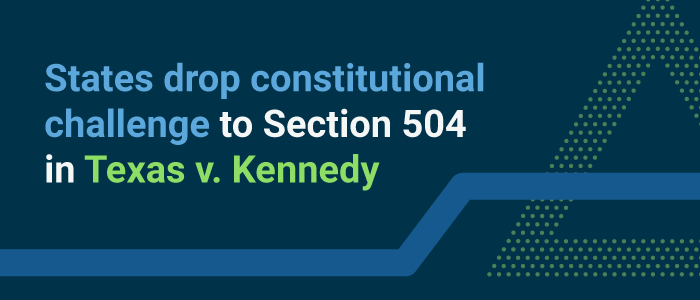States drop constitutional challenge to Section 504 in Texas v. Kennedy
On April 11, 2025, a major development occurred in the ongoing Texas v. Kennedy lawsuit (formerly Texas v. Becerra), a case brought by the state of Texas and 16 other states challenging the U.S. Department of Health and Human Services’s (HHS) updated Section 504 regulations.
In a Joint Status Report filed with the court, the plaintiff states clarified that they are not seeking any ruling that would declare Section 504 of the Rehabilitation Act unconstitutional or block its enforcement by HHS. This removes a significant legal threat to disability rights.
Specifically, Count 3 of the original legal complaint arguing that “Section 504 is Unconstitutional” has been withdrawn. If that claim had succeeded, it could have destabilized long-standing civil rights protections for people with disabilities in federally funded programs and services. Fortunately, this is not what happened.
However, there are still issues at play. While the constitutional claim has been dropped, the lawsuit continues. The remaining legal questions focus on how HHS crafted its 2024 updates to the Section 504 regulation, particularly how these updates apply in practice to public programs, digital services, and healthcare settings.
What is Section 504?
To understand why this legal development is so important, let’s briefly review what Section 504 is and what it covers.
Section 504 of the Rehabilitation Act of 1973 is a foundational civil rights law prohibiting disability-based discrimination in any program or activity receiving federal financial assistance. That includes schools, hospitals, state and local agencies, and nonprofit organizations—public or private—as long as they receive funding from federal agencies like the U.S. Department of Health and Human Services (HHS).
Under Section 504, organizations must ensure that people with disabilities have equal access to services, benefits, and programs.
Under Section 504, organizations must ensure that people with disabilities have equal access to services, benefits, and programs. This includes:
- Physical accessibility of buildings and equipment
- Effective communication (e.g., interpreters, alternate formats)
- Program accessibility through policy, staffing, and procedures
- Digital accessibility of websites, mobile apps, kiosks, and other IT systems
Unlike the ADA, which applies more broadly, Section 504 is specifically tied to federal funding—but the access requirements are similar.
Section 504 also specifically addresses issues such as accessibility requirements for internal tools used by employees, something I touched on in a recent post about ADA Title II:
Under Section 504 of the Rehabilitation Act, any organization that gets federal money must ensure its programs and tools are accessible to employees with disabilities. This means internal tools, such as employee websites, training portals, and other online resources, should be usable by everyone, including people who rely on screen readers or other assistive technology.
Why Section 504 matters
Section 504 remains a cornerstone of disability civil rights in the United States. This clarification in Texas v. Kennedy protects the law’s foundation even as legal debate continues around its application.
For agencies and organizations preparing for implementation and conformance, this ruling affirms that Section 504 is here to stay.
Deque will continue to monitor developments in this case and share relevant updates for digital accessibility and disability inclusion in government and public-sector services.
If you have questions about this or other legal and compliance matters, please schedule a free consultation with Deque today.
